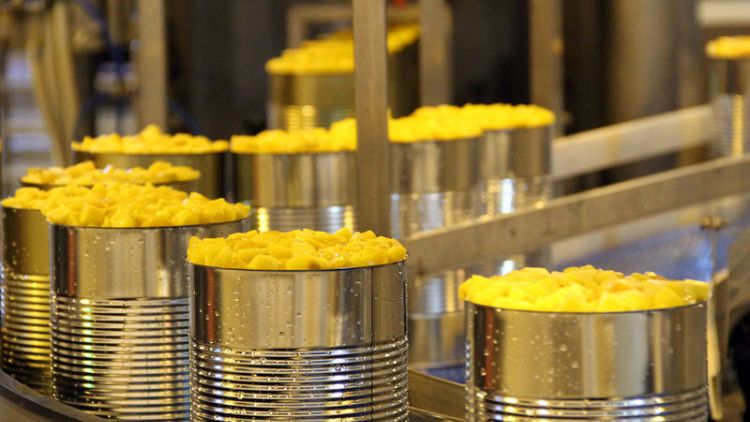By Lefteris Papadimas and Vassilis Triantafyllou
NAOUSSA, Greece (Reuters) - A tariff war between the European Union and the United States is threatening to buckle one of Greece's most buoyant export sectors, which survived a decade of economic crises but possibly not President Donald Trump.
The Trump's administration decision to impose an additional 25% tariff on a range of EU products in retaliation for EU aircraft subsidies, hits products from Scotch to Italian cheeses and French wines.
In Greece, its prized canned peach.
Greece is the world's biggest exporter of tinned peaches with about one fifth of its 250,000 tonnes annual production absorbed by the U.S. market. Formerly subject to an import levy of 18%, the new tariffs - part of WTO-authorized countermeasures to Airbus <AIR.PA> subsidies - will increase the total import duty to the United States to 43%.
The people of northern Greece are not impressed.
"Trump would do well to behave himself and let us get to work so we can have a livelihood," said peach farmer Tasos Halkidis. "We don't want this tariff business."
This fertile plain straddling the regions of Imathia and Pella in central Macedonia is one massive peach orchard. A sea of pink greets visitors in the spring, when the peaches are in bloom.
Standing in a huge warehouse piled high with millions of aluminium cans, 63-year-old Kostas Apostolou, head of the Greek Canners Association, says the dispute is threatening their livelihood and will potentially shut them out of their biggest market.
"Why are they punishing us?" Apostolou told Reuters.
PEACHES TARIFF SPIKE
The increase in tariffs came into effect on Oct. 18, just as Greeks readied to ship 50 million tins to U.S. markets.
Many customers there - mainly catering companies that supply hospitals, schools and the military - have either cancelled orders or have said they will not be prepared to pay for any tariff increase, producers said.
"Suddenly there was this (trade) war... We could never imagine that this could affect our jobs here in this small area," Apostolou said.
Stuck with excess supply, producers are also uncomfortably aware how their production lines are tailored to the U.S. market. The sector is saddled with 3-kg tins aimed at the United States, which cannot be sold in Europe, Asia or Latin America where 1-kg tins are dispatched.
The Canners Association and other industry experts say the income that will be lost from the U.S. market is about $50 million - a small amount in terms of international trade but vital for one of the poorer regions in Greece with unemployment at 20%.
They are worried that resulting excess product will lead to a collapse in prices and unemployment will jump.
The heart of Greek peach country is planted with millions of trees in an area of more than 20,000 hectares (50,000 acres). About 10,000 small farms and 10,000 employees work for 17 can factories in the area, with the peach crop giving life to the wider Imathia and Pella regions.
"It's a shock," says Eleftherios Saitis, who built one of the first can factories in the early 1970s.
The sector is already reeling from the impact of a Russian embargo on the EU fruit and vegetable sector imposed in 2014. Farmers worry this might be the final blow.
"Now with the tariffs from the United States, it will be a very big hit, it will be a catastrophe," said Halkidis.
(Editing by Michele Kambas and Frances Kerry)



